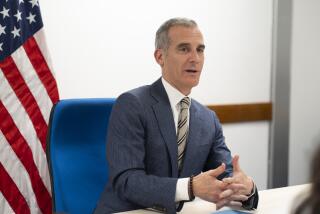A Valuable Passage to India : Top Clinton Administration officials work hard to ease tensions in the region
- Share via
Back-to-back visits to India by Defense Secretary William J. Perry and Commerce Secretary Ronald H. Brown are welcome evidence of improved relations between New Delhi and Washington, relations that were strained for too long.
The collapse of the Soviet Union, India’s main ally, prompted New Delhi to cast a wider net in its quest for friends and trading partners. When the Soviet failure occurred, Prime Minister P. V. Narasimha, who took office in 1991, already was acting to dismantle his nation’s mummified bureaucracy and to welcome foreign investment.
India clearly has fallen behind China in seeking investment from abroad, but it has advantages to offer outsiders that China does not, including democracy, a better record of political stability and a long history of private companies. Brown was accompanied by two dozen leaders of U.S. companies who signed contracts to do billions of dollars worth of business with Indian firms.
Perry signed a modest but important security agreement with Indian officials that continues incremental steps bringing the armed forces of the two countries closer. Recent years have seen small joint naval operations; now the defense secretary has agreed to more elaborate training exercises and increased exchanges of visits by military brass and civilian defense officials.
Perry wisely stopped in Pakistan before visiting India and agreed to revive consultations between U.S. and Pakistani senior military officers. The Bush Administration cut off military aid to Pakistan in 1990 when it became clear the Islamabad government was moving toward production of nuclear weapons. India’s detonation of a nuclear device 20 years ago and its refusal to sign the Nuclear Non-proliferation Treaty long have been a grave concern to Pakistan.
The U.S. cutoff was necessary, but now Washington must take pains to be seen as evenhanded by both New Delhi and Islamabad. That will enable the United States to pressure both nations to at least limit, if not eliminate, their nuclear weapons programs.
More to Read
Sign up for Essential California
The most important California stories and recommendations in your inbox every morning.
You may occasionally receive promotional content from the Los Angeles Times.













